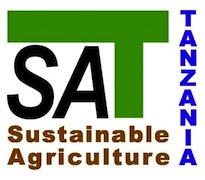SAT

SAT Vision
…is to be a credible and innovative Not for Profit Organization in sustainable agriculture in Tanzania.
SAT Mission
…is to be a vibrant organization in networking, promoting, advocating, undertaking and facilitating sustainable agriculture through research, dissemination and application.
SAT Goal
…is to contribute to improved food security and poverty reduction through offering a complete package of technology, guidance and partnership for farmers to transit to sustainable agriculture to increase their yields in an environmentally friendly way.
Sustainable Agriculture Tanzania (SAT) is an organization which was registered in June 2011. The idea to have an organization which deals with sustainable agriculture was born during the successful work of Bustani ya Tushikamane (ByT) which is a grass root project based in Morogoro. ByT has made several positive experiences by involving farmers in the planning stage to work together on challenging agricultural issues. Thus, it can be highlighted that SAT’s foundation was established on farmers’ needs. Additionally, SAT implements other stakeholders like universities, companies and governmental extension officers to be involved in activities that are carried out by SAT. This holistic approach establishes an Innovation Platform, where dissemination, research, application and networking build the main pillars. This platform is the starting point to evolve and implement systems by building on already existing knowledge. For SAT it is a precondition to deal with farmers horizontally, face to face, to acknowledge their experiences. This principle is the kit which allows building on the pillars dissemination, research, application and networking without losing the focus on farmers’ needs.
Dissemination:
For SAT dissemination means to build the capacity of value chain participants through trainings, information sharing, awareness creation, lobbying and advocacy on sustainable agriculture. The process of dissemination is a dynamic one, all stakeholders are involved and invited to contribute; feedback mechanisms and research modify this process permanently.
Research:
The focus on research is to follow an interdisciplinary approach which implements socio-economical, ecological and technical research on inputs and technologies suitable for sustainable agriculture, innovative practices on-farm and off-farm, market research, extension education and value addition. Participatory methodologies are, where possible, used guidelines.
Application:
For SAT application means the quality of being usable for a particular purpose or in a special way. Therefore it establishes a platform for knowledge incubation by practicing and demonstrating sustainable agriculture in cooperation with small scale farmers.
Networking:
SAT collaborates with stakeholders in agriculture and link participants of the value chain. Therefore a vibrant network is fostered to involve, to share and to inform.
This manifold approach builds a bridge between researchers and farmers. For sure that is urgently needed to tackle the challenges of the 21st Century like climate change, scarcity of resources and food crises. Furthermore it involves other stakeholders like companies and consumers to work out new ways and to create the needed awareness which is needed to push the idea of going towards a sustainable agriculture and a sustainable world.